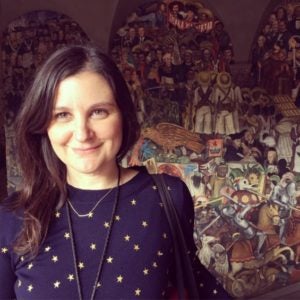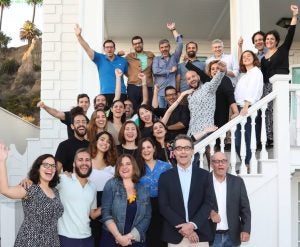A MAAS grad’s work at the intersection of diplomacy and cinematic arts is shaping American narratives and empowering storytellers around the globe.
By Isabel Roemer
When one thinks about the tools of diplomatic engagement, narrative storytelling is not usually one that comes to mind. But for Rachel Gandin Mark, Program Director of the American Film Showcase (AFS)—the State Department’s film, television, and digital diplomacy program—the two go hand-in-hand. “I love thinking about how to incorporate entertainment, particularly story and character, into specific foreign policy strategies,” says Gandin Mark, who graduated from MAAS in 2003. “Some of our country’s biggest diplomatic challenges today stem from conflicting global narratives. Film and TV, when produced with authenticity and nuance, have the potential to complicate narratives and reveal a shared human experience.”

The American Film Showcase, based at the USC School of Cinematic Arts and sponsored by a grant from the State Department’s Bureau of Educational and Cultural Affairs, works with around 50 American embassies each year to develop their film, TV, and digital storytelling programming. “The broad goals of the program,” says Gandin Mark, “are to present a more nuanced view of the U.S. through American documentaries and indie film, and to empower local content creators with tools to tell their own stories.”
In addition to the American Film Showcase, Gandin Mark oversees the Middle East Media Initiative (MEMI), a two-year professional exchange program for media professionals in the Middle East. “Recognizing that TV serves as a major influence in entertaining and informing audiences in the Arab world,” Gandin Mark said, “MEMI supports and trains the current generation of Arab TV screenwriters and content creators in telling local stories that are first and foremost entertaining, and can spark important conversations in society.” It does this by providing TV-writing workshops and shadowing and mentoring opportunities with American writers, producers, and media executives.
Though she is now a seasoned member of the Hollywood film community, having worked for esteemed organizations such as the Sundance Institute and 20th Century Fox, some of Gandin Mark’s first experiences in film date back to her time as a MAAS student. While at CCAS, she interned at the D.C.-based Arabian Sights Film Festival, learning about film distribution and curation. Gandin Mark’s motivation for entering the industry was closely tied to what she saw as the misrepresentation of Arabs in the United States. She recalled, “I studied abroad for a year in Egypt and returned frustrated that my experience was so different than what my non-Arab friends and family had assumed it was. I thought, perhaps naively, that Americans just needed to see everyday life in the Arab world on screen and their opinions would change.”

Gandin Mark has worked to correct this image in various ways. She expanded San Francisco’s Arab Film Festival to Los Angeles and served as a consultant to select screenplays when the Sundance Institute ran a Screenwriter’s Lab in Jordan with the Royal Film Commission. “During those years I had built so many relationships with Arab filmmakers that when Disney was expanding into local language production in the region, I was able to make a strong case for hiring me as a film producer,” Gandin Mark said. After producing Disney’s only Arabic language feature film, The United, she was hired to direct the American Film Showcase.
Although Gandin Mark has built a unique career bridging the spheres of diplomacy and cinematic arts, she points out that Hollywood’s important role in U.S. public diplomacy is not new: “Our country’s history is dotted with examples of Washington and Hollywood partnering on issues of foreign policy.” What is new, she says, are the rapidly changing ways content is being produced and distributed around the globe. “American companies are investing in international storytellers, and producing local language content that will be distributed direct to the consumer on a global scale,” says Gandin Mark. “I believe that this changing landscape creates new opportunities that should be embraced by D.C.’s diplomatic community, not only for those working in cultural diplomacy, but also in the political and economic tracks.”
Isabel Roemer is the CCAS Multimedia & Publications Assistant. She is studying Health Care Management & Policy at Georgetown.
This article was originally published in the Spring 2019 CCAS Newsmagazine.